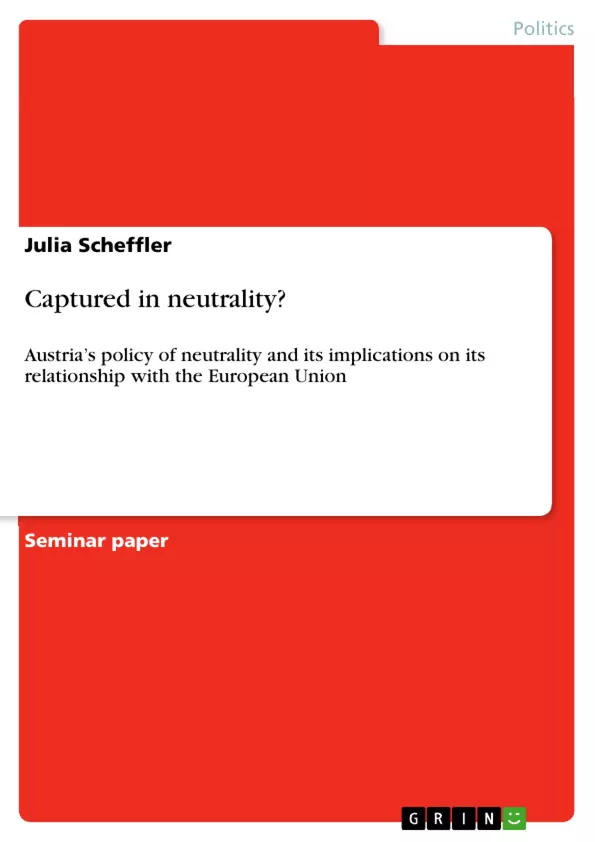This essay is going to examine Austria’s policy of neutrality especially in the light of its implications for the relationship to the European Union. What was once enforced became an important part of national identity and seemed also after the Cold War hindering an accession of Austria to the European Community. Over the past years Austria tried to adapt its principle of neutrality and thereby finally became a full member of the European Union 1995. However, the policy of neutrality is still on the agenda especially concerning the Constitution for Europe. The questions which will be addressed in that paper are: What is the meaning of Austria’s policy of neutrality in general? What did this implied for Austria’s foreign policy and its relationship to European Community? How comes, that this principle is still so important and how does Austria evaluate the Constitution for Europe in terms of neutrality?
Inhaltsverzeichnis (Table of Contents)
- Austria's Policy of Neutrality - what does that denote?
- What did the neutrality of Austria mean for its foreign policy?
- Austria's final accession to European Union – the absence of Principle of Neutrality
- Why is the Principle of Neutrality still today so important for Austria?
- Austria's neutrality policy today: their opinion towards the Constitution of Europe with regard to the Common Foreign & Security Policy (CFSP)
- Conclusion: Why does Austria still need the principle of neutrality? The future of Austria's neutrality policy
Zielsetzung und Themenschwerpunkte (Objectives and Key Themes)
This essay examines Austria's policy of neutrality and its implications for its relationship with the European Union, particularly in the context of Austria's accession to the European Union. The essay traces the historical development of Austria's neutrality policy, its impact on foreign policy, and the ongoing debate over its relevance in the modern context of European integration. The essay also considers how Austria's neutrality policy interacts with the Common Foreign & Security Policy of the European Union.
- The historical development of Austria's policy of neutrality
- The implications of neutrality on Austrian foreign policy
- Austria's accession to the European Union and the principle of neutrality
- The current status of neutrality in Austrian policy
- The interaction between Austria's neutrality policy and the Common Foreign & Security Policy of the European Union
Zusammenfassung der Kapitel (Chapter Summaries)
- The first chapter defines Austria's policy of neutrality, contrasting it with similar situations in other European countries. It highlights the constitutional basis of Austria's neutrality, dating back to 1955, and the significant role this policy played in Austria's post-war foreign policy.
- The second chapter examines the impact of neutrality on Austria's foreign policy, tracing the evolution of its foreign relations from the post-war era to the 1970s and 1980s. It explores how neutrality shaped Austria's interactions with the international community, focusing on the relationship with the European Community (EC) and the debate surrounding Austria's potential membership.
- The third chapter focuses on Austria's final accession to the European Union in 1995, discussing the challenges and compromises involved in reconciling the principle of neutrality with the requirements of EU membership. It highlights the political negotiations and the strategic considerations that led to Austria's decision to join the EU.
Schlüsselwörter (Keywords)
The main keywords and focus topics of the text include Austrian neutrality, European Union, foreign policy, international relations, European integration, Common Foreign & Security Policy (CFSP), and historical development of Austrian neutrality.
Frequently Asked Questions
What does Austria's policy of neutrality mean?
Originating in 1955, it is a constitutional principle where Austria commits to permanent neutrality, which became a core part of its national identity.
How did neutrality affect Austria's accession to the EU?
For a long time, neutrality was seen as a hindrance to joining the European Community. Austria had to adapt the principle before finally joining the EU in 1995.
Is neutrality still relevant for Austria today?
Yes, the policy remains on the political agenda, especially regarding the Common Foreign & Security Policy (CFSP) and the Constitution for Europe.
What was the impact of neutrality during the Cold War?
It allowed Austria to act as a bridge between East and West, shaping its unique foreign policy and international relations during that era.
How does Austria view the EU Constitution in terms of neutrality?
The essay examines how Austria evaluates European integration while trying to preserve its neutral status in a changing security landscape.
- Citar trabajo
- B.A. Julia Scheffler (Autor), 2005, Captured in neutrality?, Múnich, GRIN Verlag, https://www.grin.com/document/116686



